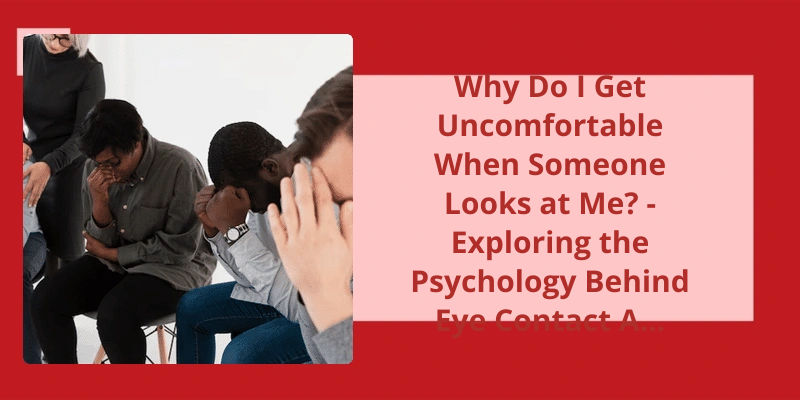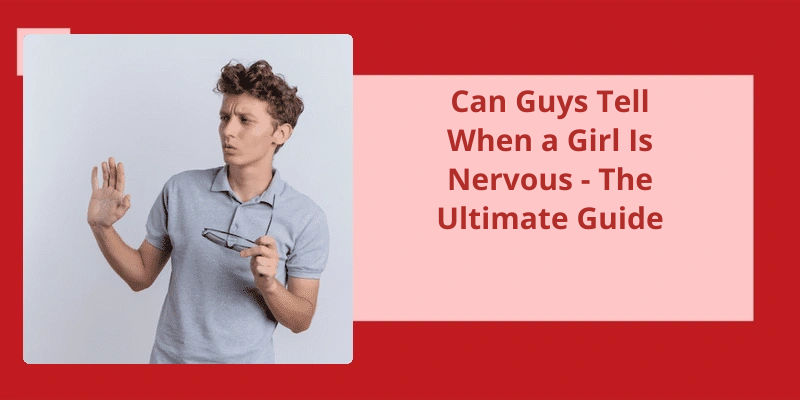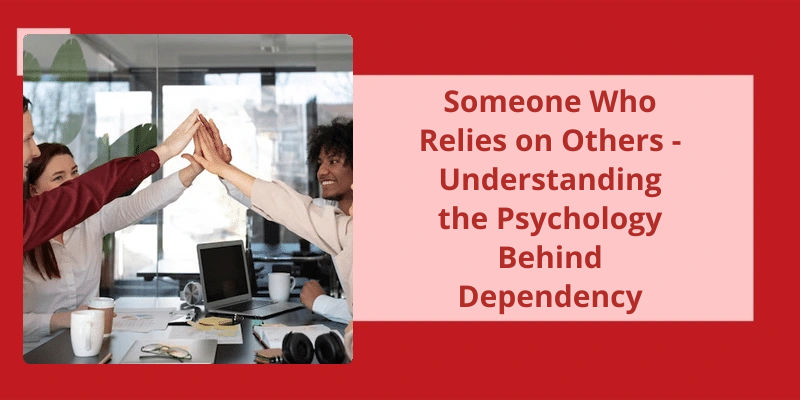Have you ever found yourself feeling uneasy or uncomfortable when someone looks at you? Perhaps you experience hot flashes or your heart starts to race. This feeling isn’t uncommon and could be a sign of scopophobia – an excessive fear of being stared at. Scopophobia can trigger physical symptoms such as sweating or shaking, and is often associated with other social anxieties. It can be incredibly challenging to manage and may negatively impact one's ability to socialize and communicate effectively. In this article, we will explore the causes of scopophobia and discuss some ways to cope with and overcome it.
Why Am I So Scared of Eye Contact?
Whatever the cause may be, there are many people who struggle with eye contact anxiety on a regular basis. Understanding this fear is important as it can affect how individuals are perceived in both personal and professional settings.
It can develop as a result of specific experiences, traumas, or fears. For example, someone who’s experienced bullying or abuse may develop a fear of eye contact as a result of their experiences. The fear may also be rooted in cultural and societal norms, such as those surrounding gender and communication.
One effective method might involve working with a therapist or counselor to identify the underlying cause of the fear. A therapist might use cognitive-behavioral techniques to help individuals challenge negative thoughts and behaviors related to eye contact. Additionally, practicing eye contact in safe and supportive environments can help individuals build their confidence and become more comfortable with direct eye contact in their personal and professional lives.
Strategies for Overcoming Eye Contact Anxiety in Social Situations
- Practice looking into the eyes of people you trust or feel comfortable around
- Start with brief periods of eye contact and gradually increase the length of time
- Focus on the space between the person’s eyes or on their nose or mouth if direct eye contact feels too intense
- Remind yourself that most people don’t scrutinize others’ eye contact and that awkward moments are normal
- Engage in activities that boost your confidence and self-esteem, such as exercise or adopting positive self-talk
- Seek professional help if social anxiety and eye contact anxiety are interfering with your daily life
It’s common to experience discomfort around certain individuals, and it can be caused by various reasons. Whether it’s due to romantic feelings, a toxic personality, social anxiety, or inadequate social skills, feeling uneasy is a common human emotion. However, knowing how to handle these situations can make all the difference in your interactions with others.
Why Do I Get Uncomfortable When I See Someone?
It’s also possible that your discomfort is connected to past experiences, such as being bullied or rejected. These experiences can create a sense of fear or hesitation around certain types of people. Similarly, if youve been hurt or betrayed in the past, you might feel guarded or defensive around certain people.
In some cases, discomfort can stem from a sense of insecurity or comparison. If you feel like someone is more successful, attractive, or confident than you, it can trigger feelings of inadequacy or self-doubt. This can be especially true if youre already prone to self-criticism or negative self-talk.
It’s important to remember that discomfort doesn’t necessarily mean that theres something wrong with the other person or with you. Everyone has their own set of quirks and habits, and some people just don’t click. This doesn’t mean that theyre bad people or that youre a bad person; it just means that you may not be compatible in certain ways.
If you find that youre consistently uncomfortable around certain people, it’s worth examining your own thoughts and feelings to see if there are any patterns or underlying issues. Are you projecting your own insecurities onto the other person? Are you avoiding certain topics or conversations because they make you uncomfortable? Are you holding onto past experiences that are clouding your judgment?
Ultimately, the best way to deal with discomfort is to acknowledge it and address it head-on. This might mean talking to a therapist, journaling your thoughts and feelings, or simply confronting any issues that arise in your interactions with others. With time and effort, you can learn to navigate your discomfort and build more fulfilling connections with those around you.
Source: How to Stop Feeling Uncomfortable Around People (+Examples)
However, it’s important to note that eye contact can be a powerful tool in communication and building connections with others. So why does eye contact make some people nervous? Let’s explore this further.
Does Making Eye Contact With Someone Make Them Feel Uncomfortable?
Eye contact is a fundamental part of human communication. However, it’s a complex process that triggers different emotions in different people. For some, making eye contact with someone can be an anxiety-inducing experience, and they might feel uncomfortable or nervous.
In some cases, people may feel like the persons gaze is piercing into their soul or something. This is often due to the psychological concept of gaze perception. When we make eye contact with someone, we can often tell if theyre looking at us or not, even if we cant see their eyes. This can trigger the feeling that theyre looking directly into our soul or reading our thoughts. It’s a common phenomenon that can cause anxiety and discomfort in some people.
In fact, some people find it easy and natural to hold a gaze during a conversation. However, for those who do experience discomfort, it’s important to remember that it’s a normal feeling that many people experience. There are also strategies that can help, such as practicing making eye contact in low-stress situations or using mindfulness techniques to help manage anxiety.
For some people, it can trigger feelings of nervousness or discomfort, particularly when dealing with someone they know well. However, it’s important to recognize that these feelings are normal and that there are strategies that can help manage them.
Tips for Maintaining Appropriate Eye Contact in Different Social Situations (e.g. Business Meetings, Social Gatherings)
Maintaining appropriate eye contact is essential in communicating effectively. In business meetings, maintaining eye contact shows interest and confidence, but avoid staring too long. In social gatherings, it’s important to show interest in the person you’re talking to, but also allow yourself to look away and scan the room. Adjust your eye contact based on the situation and the other person’s body language. Remember to be natural and comfortable, and don’t force yourself to maintain eye contact if it makes you or the other person uncomfortable.
Our instincts play a crucial role in how we perceive and interact with others. It’s not uncommon to encounter people who trigger our alarm systems, making us feel agitated and uncomfortable. So, why do some people have this effect on us? Let’s dive deeper into the psychology and science behind this unsettling feeling.
Why Do Some People Make You Feel So Uncomfortable?
You don’t know exactly what it is, but it makes you uneasy and urges you to stay away from them. Perhaps it’s the energy they give off or the vibes they emit. It could be a combination of things. Maybe they remind you of someone you don’t get along with or have had a bad experience with in the past. It’s hard to pinpoint exactly what causes this discomfort, but it’s there nonetheless.
Sometimes, you might try to shake off this feeling, convince yourself that youre just being paranoid or overreacting. But the truth is, you cant help the way you feel. Your subconscious mind has picked up on something that your conscious mind hasnt yet processed. And your bodys natural fight or flight response kicks in, making you want to get away from this person as soon as possible.
One thing to keep in mind is that everyone has different energy levels and personalities. Some individuals are simply more intense or aggressive than others, and that can throw us off balance. Similarly, some people are naturally reserved or introverted, making it harder to read them or connect with them.
It’s important to trust your gut feeling when it comes to interacting with others. Dont force yourself to socialize with someone just because it’s expected of you. Acknowledge the discomfort you feel and take steps to protect yourself, whether that means avoiding this person altogether or setting clear boundaries during interactions.
Ultimately, the key is to remember that it’s not always your fault if you feel uncomfortable around someone. You don’t owe anyone your time or energy, and it’s okay to prioritize your own well-being and safety. It’s better to err on the side of caution than to put yourself in a potentially harmful situation.
Strategies for Setting and Communicating Boundaries With People Who Make You Uncomfortable
- Identify which behaviors make you uncomfortable
- Decide what boundaries you need to set to address these behaviors
- Communicate your boundaries clearly and directly
- Stick to your boundaries consistently
- Be willing to reassess and adjust your boundaries as needed
- Seek support from friends, family, or a therapist if necessary
Social anxiety can be a debilitating condition, and one of the difficulties that can come with it’s the constant worry about what others are thinking or how they might be judging you. This can make it difficult to navigate social situations and can even lead to avoidance behaviors. However, there are strategies that you can use to help you stop worrying about people staring and thinking that everyone is looking at you. By recognizing the root of your anxieties and taking steps to address them, you can take control of your thoughts and lead a more fulfilling social life.
How Do I Stop Worrying About People Staring?
Feeling self-conscious in social situations can be difficult to deal with. The suspicion that people are staring or judging you can cause anxiety and make it difficult to enjoy spending time with others. Although it’s natural to feel a bit embarrassed or nervous sometimes, constantly worrying about what others think can take a toll on your mental health. To overcome this, it’s important to take control of your thoughts and recognize that you’ve the power to change the way you feel.
One effective way to overcome feelings of self-consciousness is to recognize that people aren’t always looking at you. It’s easy to feel like everyone is staring when youre feeling uncomfortable, but this is typically not the case. Instead of assuming the worst, try to look around and observe how others are behaving. Youll likely find that most people are just going about their day without giving you a second thought.
If you do notice someone looking at you, try to smile and acknowledge their presence. A simple “hello” or wave can help break the tension and make you feel more at ease. Remember, most people arent intentionally trying to make you feel uncomfortable. By being friendly and open, you may find that others are more likely to approach you in a positive way.
Are you worried about what others think of your appearance or behavior? Are you feeling judged or criticized? Once you understand the root cause of your anxiety, you can start to address it. This may involve talking to a therapist or counselor, practicing self-care, or learning new coping techniques.
It’s also important to clean up your own thoughts. Self-talk can have a powerful impact on your mental health and wellbeing. If you find yourself engaging in negative self-talk, try to replace these thoughts with positive affirmations. Instead of saying “I look stupid” to yourself, try saying “Im confident and comfortable in my own skin.”. This can take some practice, but it’s an important step in overcoming self-consciousness.
Finally, if youre struggling with social anxiety, it may be helpful to seek professional help. A therapist or counselor can work with you to identify the root cause of your anxiety and develop a plan to overcome it. This may involve cognitive-behavioral therapy, exposure therapy, or other forms of treatment. With the right support, it’s possible to overcome self-consciousness and enjoy spending time with others.
How to Be More Assertive and Confident in Social Situations
Assertiveness and confidence in social situations can be improved by practicing self-awareness, setting boundaries, and using direct communication. Pay attention to your thoughts and feelings, identify your values, and clearly communicate your needs and wants. It’s also helpful to practice active listening, maintain eye contact, and use confident body language. Finally, it may be beneficial to seek support from a therapist or coach.
Conclusion
In conclusion, scopophobia is a very real and debilitating anxiety disorder that can have a significant impact on an individual's quality of life. The fear of being stared at can lead to a variety of physical symptoms, leaving sufferers feeling anxious, uncomfortable, and overwhelmed. It’s important that people understand the impact that this disorder can have and work to support those who’re struggling with it. Through education, understanding, and empathy, we can help to reduce the stigma surrounding scopophobia and promote a more inclusive and compassionate society for all.






